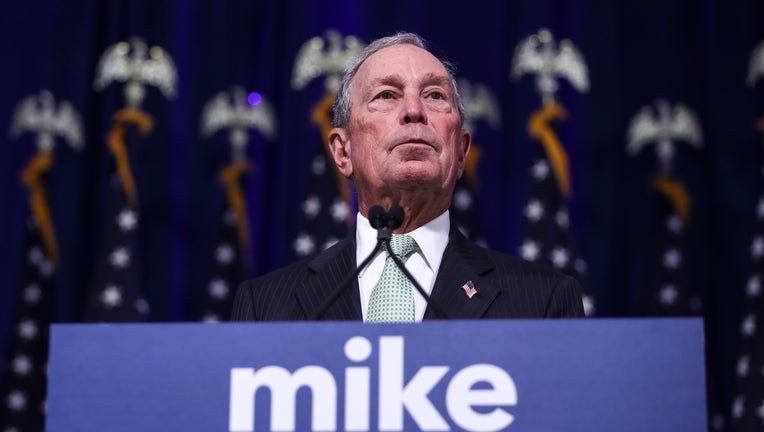Bloomberg initial ad buy floods airwaves, including in Minnesota

Newly announced Democratic presidential candidate, former New York Mayor Michael Bloomberg speaks during a press conference to discuss his presidential run on November 25, 2019 in Norfolk, Virginia. The 77-year old Bloomberg joins an already crowded (Drew Angerer / Getty Images)
(FOX 9) - Billionaire Mike Bloomberg’s estimated $37 million on an initial round of television ads includes hundreds of spots in the Twin Cities, and Bloomberg’s spending is more than almost every other 2020 presidential candidate combined.
Bloomberg’s tally is 50 times what U.S. Sen. Amy Klobuchar has spent all year on TV ads, according to the political ad tracker website FiveThirtyEight. Klobuchar ran her first ads in October in Iowa and New Hampshire, costing an estimated $720,000, the website said.

Michael Bloomberg buys cross-country campaign ads, including in MN
Minnesota's airwaves are covered in Michael Bloomberg ads after he entered the presidential race.
During an appearance on ABC this weekend, Klobuchar criticized Bloomberg’s late entry into the race.
“I don’t think people are going to buy it that you just put a bunch of money and maybe the argument is, maybe I’ve got more money than the guy in the White House,” Klobuchar said. “I don’t think they’re going to buy that. I think they want someone different.”
Bloomberg’s ad spending includes at least $363,050 for 297 spots at three TV stations in the Twin Cities, according to the stations’ public filings with the Federal Communications Commission. A fourth station hadn’t reported as of Monday afternoon, so the total tally is likely higher.
Bloomberg’s campaign is also spending $81,000 split among three stations in the Rochester market, according to a public filing.
Ending weeks of speculation, the 77-year-old former Republican and New York City mayor announced his candidacy Sunday in a written statement posted on a campaign website describing himself as uniquely positioned to defeat President Donald Trump. He quickly followed with a massive advertising campaign blanketing airways in key primary states across the U.S.
"I'm running for president to defeat Donald Trump and rebuild America," Bloomberg wrote.
"We cannot afford four more years of President Trump's reckless and unethical actions," he continued. "He represents an existential threat to our country and our values. If he wins another term in office, we may never recover from the damage."
Bloomberg's entrance comes just 10 weeks before primary voting begins, an unorthodox move that reflects anxiety within the Democratic Party about the strength of its current candidates.
As a centrist with deep ties to Wall Street, Bloomberg is expected to struggle among the party's energized progressive base. He became a Democrat only last year. Yet his tremendous resources and moderate profile could be appealing in a primary contest that has become, above all, a quest to find the person best-positioned to deny Trump a second term next November.
Forbes ranked Bloomberg as the 11th-richest person in the world last year with a net worth of roughly $50 billion. Trump, by contrast, was ranked 259th with a net worth of just over $3 billion. His businesses -- among them are financial data services and news services in various formats -- employ more than 19,000 people in 69 countries. They are also certain to raise ethical questions about how his news-oriented businesses will cover the campaign and financial conflicts of interest for a possible presidency.
Already, Bloomberg has vowed to spend at least $150 million of his fortune on various pieces of a 2020 campaign, including more than $100 million for internet ads attacking Trump, between $15 million and $20 million on a voter registration drive largely targeting minority voters, and more than $30 million on an initial round of television ads.
Bloomberg does not speak in his announcement video, which casts him as a successful businessman who came from humble roots and ultimately "put his money where his heart is" to effect change on the top policy issues of the day -- gun violence, climate change, immigration and equality, among them.
Bloomberg has devoted tens of millions of dollars to pursue his policy priorities in recent years, producing measurable progress in cities and states across America. He has helped shutter 282 coal plants in the United States and organized a coalition of American cities on track to cut 75 million metric tons of carbon emissions by 2025.
But he is far from a left-wing ideologue.
Bloomberg has declined to embrace Medicare for All as a health care prescription or the "Green New Deal" to combat climate change, favoring a more pragmatic approach.
The Associated Press contributed to this report.

